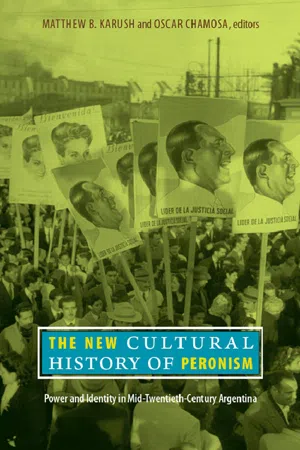
The New Cultural History of Peronism
Power and Identity in Mid-Twentieth-Century Argentina
- English
- PDF
- Available on iOS & Android
The New Cultural History of Peronism
Power and Identity in Mid-Twentieth-Century Argentina
About This Book
In nearly every account of modern Argentine history, the first Peronist regime (1946–55) emerges as the critical juncture. Appealing to growing masses of industrial workers, Juan Perón built a powerful populist movement that transformed economic and political structures, promulgated new conceptions and representations of the nation, and deeply polarized the Argentine populace. Yet until now, most scholarship on Peronism has been constrained by a narrow, top-down perspective. Inspired by the pioneering work of the historian Daniel James and new approaches to Latin American cultural history, scholars have recently begun to rewrite the history of mid-twentieth-century Argentina. The New Cultural History of Peronism brings together the best of this important new scholarship.
Situating Peronism within the broad arc of twentieth-century Argentine cultural change, the contributors focus on the interplay of cultural traditions, official policies, commercial imperatives, and popular perceptions. They describe how the Perón regime's rhetoric and representations helped to produce new ideas of national and collective identity. At the same time, they show how Argentines pursued their interests through their engagement with the Peronist project, and, in so doing, pushed the regime in new directions. While the volume's emphasis is on the first Perón presidency, one contributor explores the origins of the regime and two others consider Peronism's transformations in subsequent years. The essays address topics including mass culture and melodrama, folk music, pageants, social respectability, architecture, and the intense emotional investment inspired by Peronism. They examine the experiences of women, indigenous groups, middle-class anti-Peronists, internal migrants, academics, and workers. By illuminating the connections between the state and popular consciousness, The New Cultural History of Peronism exposes the contradictions and ambivalences that have characterized Argentine populism.
Contributors: Anahi Ballent, Oscar Chamosa, María Damilakou, Eduardo Elena, Matthew B. Karush, Diana Lenton, Mirta Zaida Lobato, Natalia Milanesio, Mariano Ben Plotkin, César Seveso, Lizel Tornay
Frequently asked questions
Information
Table of contents
- Contents
- Acknowledgments
- Introduction
- Populism, Melodrama, and the Market: The Mass Cultural Origins of Peronism
- Peronists and Cabecitas: Stereotypes and Anxieties at the Peak of Social Change
- The Malon de La Paz of 1946: Indigenous Descamisados at the Dawn of Peronism
- Criollo and Peronist: The Argentine Folklore Movement during the First Peronism, 1943–1955
- Unforgettable Kitsch: Images around Eva Perón
- Working-Class Beauty Queens Under Peronism
- Peronism in ‘‘Good Taste’’: Culture and Consumption in the Magazine Argentina
- Political Emotions and the Origins of the Peronist Resistance
- Final Reflections
- Bibliography
- About the Contributors
- Index